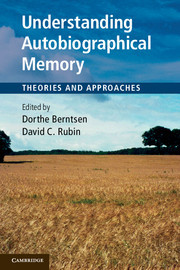Understanding Autobiographical Memory Theories and Approaches
Langue : Anglais
Coordonnateurs : Berntsen Dorthe, Rubin David C.

Reviews and integrates the many theories, perspectives and approaches in the field of autobiographical memory.
The field of autobiographical memory has made dramatic advances since the first collection of papers in the area was published in 1986. Now, over 25 years on, this book reviews and integrates the many theories, perspectives, and approaches that have evolved over the last decades. A truly eminent collection of editors and contributors appraise the basic neural systems of autobiographical memory; its underlying cognitive structures and retrieval processes; how it develops in infancy and childhood, and then breaks down in aging; its social and cultural aspects; and its relation to personality and the self. Autobiographical memory has demonstrated a strong ability to establish clear empirical generalizations, and has shown its practical relevance by deepening our understanding of several clinical disorders - as well as the induction of false memories in the legal system. It has also become an important topic for brain studies, and helped to enlarge our general understanding of the brain.
1. Introduction Dorthe Berntsen and David C. Rubin; Part I. Approaches to the Study of Autobiographical Memory: 2. The basic systems model of autobiographical memory David C. Rubin; 3. Identity, emotion, and the social matrix of autobiographical memory: a psychoanalytic narrative view Tilmann Habermas; 4. On the nature of autobiographical memory Martin A. Conway and Laura Jobson; 5. Reflections on autobiographical memory Alan Baddeley; Part II. Neural Studies of Autobiographical Memory: 6. The contribution of research on autobiographical memory to past and present theories of memory consolidation Morris Moscovitch; 7. Functional neuroimaging of autobiographical memory Peggy L. St Jacques; Part III. Social and Cultural Aspects of Autobiographical Memory: 8. Of sins and virtues: memory and collective identity William Hirst, Alexandra Cuc and Dana Wohl; 9. Historically defined autobiographical periods: their origins and implications Norman R. Brown, Tia G. B. Hansen, Peter J. Lee, Sarah A. Vanderveen and Fredrick G. Conrad; 10. Directive functions of autobiographical memory: theory and method David B. Pillemer and Kie J. Kuwabara; Part IV. Development of Autobiographical Memory from Infancy to Old Age: 11. The life I once remembered: the waxing and waning of early memories Patricia J. Bauer; 12. Subjective perspective and personal timeline in the development of autobiographical memory Robyn Fivush; 13. Theory and research in autobiographical memory: a life-span developmental perspective Joseph M. Fitzgerald and Carissa L. Broadbridge; Part V. Evolution and Basic Processes of Autobiographical Memory: 14. Evolutionary origins of autobiographical memory: a retrieval hypothesis Merlin Donald; 15. Spontaneous recollections: involuntary autobiographical memories are a basic mode of remembering Dorthe Berntsen; 16. Autobiographical memory and future thinking Arnaud D'Argembeau; Part VI. Discussion: 17. Understanding autobiographical memory: an ecological theory Dorthe Berntsen and David C. Rubin.
Dorthe Berntsen is a Professor in the Department of Psychology and Behavioural Sciences at the University of Aarhus where she was awarded a Centre of Excellence grant from the Danish National Research Foundation to establish the Center on Autobiographical Memory Research. She is the author of Involuntary Autobiographical Memories: An Introduction to the Unbidden Past (Cambridge University Press, 2009).
David C. Rubin is Juanita M. Kreps Professor of Psychology and Neuroscience at the Duke Institute for Brain Sciences, Duke University. He is a leading researcher in the field of autobiographical memory and the editor of Remembering our Past: Studies in Autobiographical Memory (Cambridge University Press, 1996) and Autobiographical Memory (Cambridge University Press, 1986) among other books.
David C. Rubin is Juanita M. Kreps Professor of Psychology and Neuroscience at the Duke Institute for Brain Sciences, Duke University. He is a leading researcher in the field of autobiographical memory and the editor of Remembering our Past: Studies in Autobiographical Memory (Cambridge University Press, 1996) and Autobiographical Memory (Cambridge University Press, 1986) among other books.
Date de parution : 09-2012
Ouvrage de 381 p.
15.1x22.8 cm
Disponible chez l'éditeur (délai d'approvisionnement : 14 jours).
Prix indicatif 45,81 €
Ajouter au panierDate de parution : 09-2012
Ouvrage de 381 p.
15.5x23.4 cm
Disponible chez l'éditeur (délai d'approvisionnement : 14 jours).
Prix indicatif 95,70 €
Ajouter au panierThème d’Understanding Autobiographical Memory :
© 2024 LAVOISIER S.A.S.



